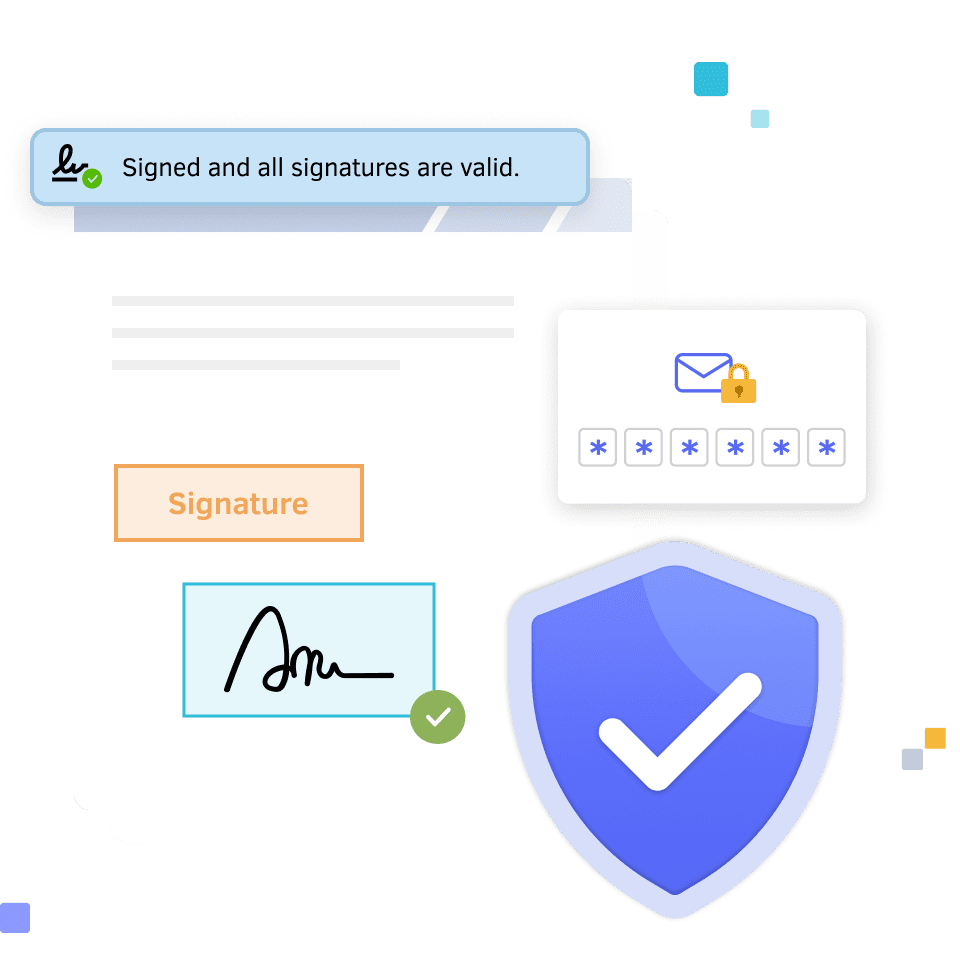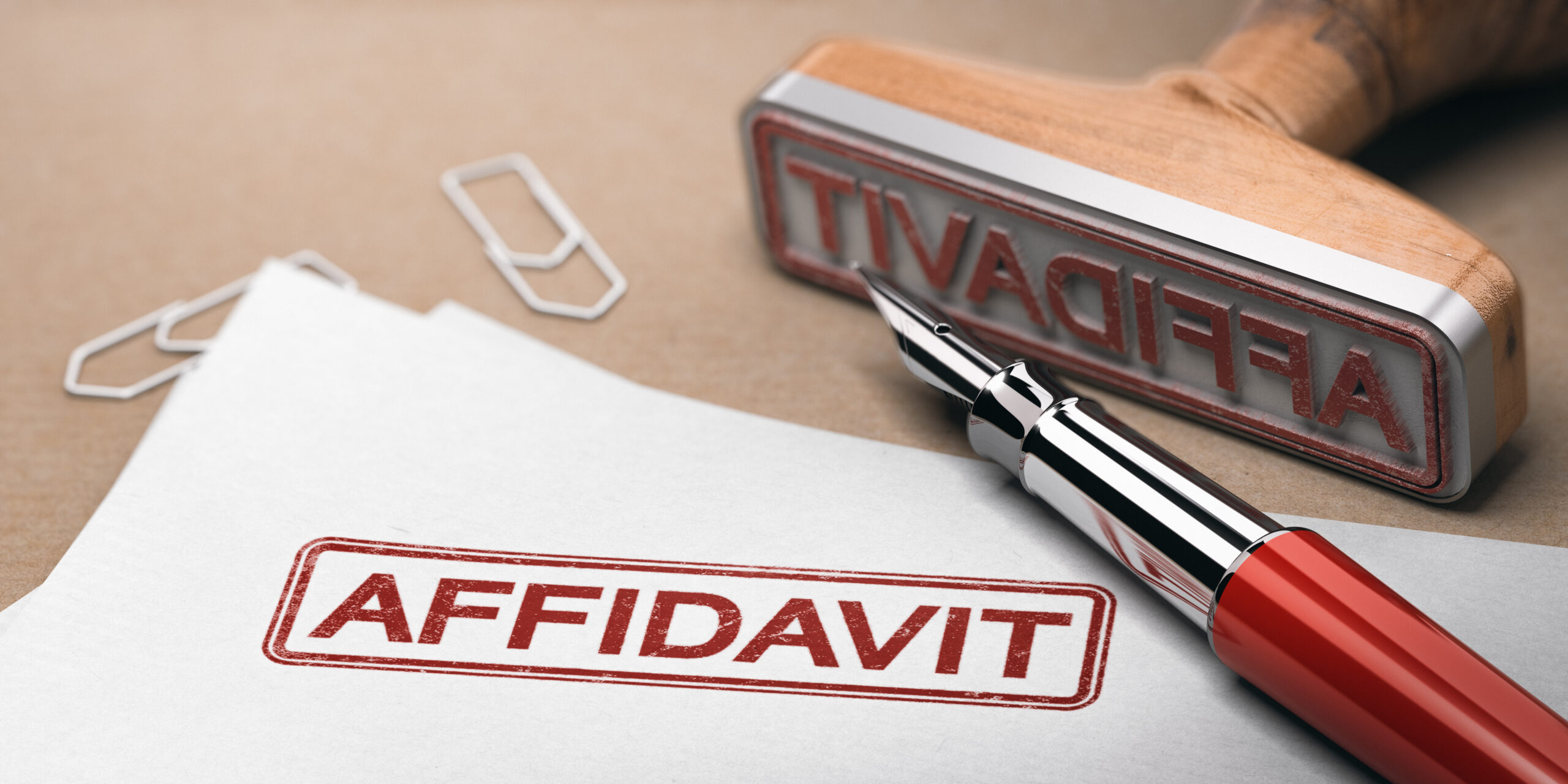[Affidavit Meaning] What Is an Affidavit and How To Use This Legal Document?
An affidavit is a sworn statement of fact used in various legal proceedings, including courtroom cases, estate planning, and property management. It is one of the most common legal documents that plays a pivotal role in many different situations. You, as one who may need to use an affidavit, must be aware of its significance and legal implications.
Understanding the concept of an affidavit and its legal implications can help you navigate situations where you need to provide a sworn statement or verify facts under oath. By learning how to effectively use an affidavit, you can ensure that your facts are well represented in any court hearings or legal proceedings. Whether it is an affadavit of death or a financial affidavit, these documents are crucial for providing a legally binding statement.
What Is an Affidavit? The Legal Definition (Affidavit Meaning)
What does the term ‘Affidavit’ mean?
An affidavit is a written statement made under oath, where the signer, known as the affiant, swears to the truthfulness of the information provided. This legal document is often required in various legal proceedings, from courtroom cases to property transfers.
This document plays a significant role in legal cases because it provides courts with authenticated facts. All statements made under oath are considered truthful and accurate. The signer’s responsibility is to ensure that the written statement is accurate and reflects the true details to the best of their knowledge.
An affidavit is often used in legal proceedings to authenticate information. In certain cases, an affidavit of death may be required in probate court to transfer property after someone passes away. In domestic relations law, a financial affidavit is frequently needed to disclose income, assets, and debts during divorce proceedings.

The affidavit meaning extends beyond mere words; it embodies a commitment to honesty and integrity, as the signer must affirm that the contents of the affidavit are true and accurate under oath. By swearing under penalty of perjury, the signer ensures the affidavit can be used as evidence in court, reinforcing its role as a legally binding document.
Who is considered an Affiant in an Affidavit?
An affiant, also known as a declarant, is one who swears to a statement of fact in the affidavit. This individual is responsible for providing truthful information and is often someone directly involved in litigation or with personal knowledge pertinent to the case. The declarant plays a critical role because the credibility of the declaration hinges on their willingness to voluntarily attest to the accuracy of the claims made within the document.
As an illustration, in a financial affidavit, the declarant must disclose all financial information accurately, which can influence courtroom decisions in divorce cases or family law disputes. Similarly, in civil cases, an affadavit can be used to support the submission of evidence during court hearings.
What constitutes a Sworn Statement in an Affidavit?
A sworn statement in an affidavit is a declaration made under oath, which attests to the truthfulness of the information presented. This sworn statement carries legal implications and can be seen as evidence in court proceedings. According to legal guidelines, approximately 80% of court cases involving affidavit evidence require witnesses to be asked whether they adhere to the contents of their sworn statements or confirm the truthfulness of their statements.
The affidavit must clearly state that the declarant is providing this information under penalty of perjury, emphasizing the seriousness of the oath taken. This ensures that the facts included are correct to the best of the affiant’s personal knowledge and are relevant to the courtroom context.
Such affidavits are used in a variety of legal contexts, including civil, criminal, and family law cases. For instance, affidavits are often used in family law to validate important documents, such as a marriage certificate. In cases of estate planning or divorce, a financial affidavit is often submitted to detail the declarant’s financial status, and an sworn statement to affirm the validity of a marriage certificate to settle disputes about marriage status or legal benefits.

Affidavits in the Digital Age: Streamlining with eSignatures
As legal documents like affidavits become increasingly common in both personal and professional life, the demand for efficient, secure signing solutions has risen dramatically.
Traditionally, affadavits required in-person signatures and a notary public’s physical presence, which could lead to delays and logistical challenges. In today’s digital world, however, this process has been revolutionized by eSignatures.
Tools like DottedSign allow you to quickly sign affidavits, upload supporting documents, and even have the document notarized—all from the comfort of your home or office. This modern solution ensures that your affidavits remain legally binding and secure.
Think about it, you can even sign affidavits on mobile devices such as iPhones, making the process more efficient.
How eSignatures Simplify the Affidavit Process:
- Speed: No more waiting for in-person meetings or mailing documents. With DottedSign, you can sign an affidavit and share it instantly, reducing the time spent on paperwork.
- Security: eSignatures through DottedSign meet all legal requirements, ensuring your affidavits are securely stored and legally binding. Learn more about digital signatures here.
- Convenience: Whether you are a property manager handling multiple affidavits for tenants, or a homeowner managing your estate documents, eSignatures streamline the process, allowing for faster handling of important legal documents. With DottedSign, you can even electronically sign Word documents.
Incorporating eSignatures into your affadavit workflow not only simplifies the signing process but ensures that your documents are valid for use in court proceedings and other legal matters. In fact, many courtroom systems have adapted to accepting electronically signed documents, ensuring that the digital transformation aligns with traditional legal practices.
Ready to make signing affidavits easier? Start Your Free Trial with DottedSign today.
[Steps and Guidelines] How to Write an Affidavit
Writing an affidavit requires adherence to specific legal guidelines to ensure it is accepted in a court of law. Proper formatting, inclusion of relevant facts, and clear language are all critical components. When drafting an affadavit, it is important to remember that it is a legal document and should be treated with the utmost care to ensure the truthfulness of the information presented.
What information is required to write an Affidavit?
To write an affidavit, follow these essential steps to ensure it is legally binding and properly formatted:
- Title: Clearly state the type of affidavit. The affidavit must begin with a title, which often includes the words “Affidavit of” followed by the name or subject matter. For instance, “Affidavit of John Doe” for a general affidavit or a more specific title such as “Affidavit of Property Ownership” and “Affidavit of Financial Status” in divorce cases.
- Affiant Information: The signer must provide their full name, address, and relationship to the subject matter. This information ensures the signer is identified and held accountable for the statements made in the affidavit.
- Sworn Statements: The body of the affidavit contains a series of numbered paragraphs outlining the facts the declarant wishes to verify. It is crucial to provide specific details, as the affidavit can be used as evidence in court proceedings.
- Signature and Notarization: Finally, the affidavit must be signed by the affiant and notarized. This step is essential for the document to be recognized as a legally binding document. Without a signature or the presence of a notary public, the affidavit may not hold legal validity.
If you are looking for a more efficient way to handle affidavits, consider using DottedSign for electronic signatures. With DottedSign, you can streamline the affidavit process, ensuring it remains legally compliant with eSignature laws in the U.S. (such as the ESIGN Act) while saving time and reducing paperwork.
How do you format an Affidavit form?
Formatting is crucial when drafting an affidavit to ensure its acceptance in legal settings. The structure must include:
- A clear title
- A declaration of the declarant’s oath at the beginning of the document
- Numbered statements for clarity
- A signature line for both the declarant and the notary public
Each affidavit must follow a formal structure to be accepted in court proceedings, as deviations could result in the affadavit being rejected by the court.
What language should be used in an Affidavit?
The language used in an affidavit should be formal, precise, and focused on stating facts clearly. It is advisable to use straightforward language that avoids ambiguity.
Using clear language ensures that the information contained in the affidavit is easily understood by all relevant parties involved, including judges and legal professionals.
Statements such as “I swear” or “I affirm” are commonly used to signal the affidavit’s binding nature under oath, whether it is a financial affidavit or a general affidavit for other legal matters.
How to Sign an Affidavit and the Role of a Notary Public

What is the process to sign an Affidavit?
To sign an affidavit, the declarant must do so in the presence of a notary public. This ensures that the affidavit is valid and can be used in legal proceedings. The affiant should thoroughly review the document before signing to ensure all facts included in the affidavit are accurate and correct to the best of their knowledge.
Once satisfied with the content, the declarant will sign the document, thereby affirming the truthfulness of the statements made. It is crucial that the signature on the affidavit matches the name used in the document to maintain consistency and validity.
This sworn statement is a critical part of the legal process, as the affiant is taking an oath to tell the truth, and any falsehoods could result in charges of perjury.
Why is it important to notarize an Affidavit?
Notarizing an affidavit is a critical step that lends credibility and authenticity to the document.
The notary public acts as an impartial witness, verifying the identity of the signer and ensuring that the affidavit is signed voluntarily.
This process helps to prevent fraud and provides a level of assurance that the affidavit can be relied upon in litigation.
Notarization also solidifies the legal binding nature of the affadavit, making it more challenging to contest its validity.
What does a Notary Public do in the Affidavit Process?
A notary public plays a vital role in the affidavit process by acting as a third-party witness to the signing of the document.
After verifying the identity of the declarant, the notary public will typically sign and stamp the affidavit, indicating that they have witnessed the signing and that the affidavit has met all legal requirements.
This process not only adds a layer of trust but also enhances the affadavit’s acceptance in a court of law, as most judicial processes require notarized documents for validation.
What happens after an Affidavit is filed?
After you file your affidavit and provide supporting evidence, the prosecutor will carefully examine both to determine whether criminal charges should be pursued. Based on this review, your affadavit will either be accepted or rejected. This process typically takes under a week. To stay updated on the progress, you can contact the Attorney’s Office of your region approximately one week after your submission to check the status.

What is an Affidavit used for? (Its Common Uses in Legal Proceedings)
What are some examples of Affidavits used in Legal Cases?
Affidavits are used in a variety of legal cases, and each different type of affidavit serves a specific purpose. For instance, an affidavit of death is used in estate planning to transfer property after a person passes away, while a financial affidavit is common in divorce proceedings to disclose financial information. Whether it is a general affidavit or one for a specialized legal requirement, knowing which type of affidavit to use is critical for its validity in court.
These examples illustrate the versatility of affidavits, as they can be tailored to meet the specific needs of various legal contexts.
Affidavits can also be used in family law cases and for courtroom procedures, further emphasizing their importance in the legal system.
In what situations might you need to use an Affidavit?
An affidavit may be required in various situations, such as when submitting evidence in court, applying for certain licenses, or verifying identity. Many judicial cases use affidavits to verify facts and provide sworn testimony.
For individuals involved in court proceedings, utilizing an affidavit can strengthen their position by offering a sworn account of the facts. For example, individuals might use affidavits in court to attest to the accuracy of financial details or personal information.
Additionally, affidavits may be necessary in administrative processes where verification of information is required, such as applying for government benefits or in real estate transactions.
Understanding the legal definition and importance of affidavits ensures you know when and how to use them effectively.
How does an Affidavit help in Estate Planning?
In estate planning, an affidavit is crucial for verifying the intentions of the deceased, particularly in the distribution of assets. In some instances, a general affidavit may be used to affirm that a will is valid or to clarify the wishes of the deceased regarding their estate.
This written statement helps to streamline the probate process and can significantly reduce disputes among heirs and beneficiaries, as it provides a clear account of the decedent’s wishes. The use of affidavits in estate planning can also ensure that the distribution of assets adheres to legal requirements, preventing costly legal disputes.
For instance, an affidavit might be used to verify the contents of a marriage certificate or other legal documents, thereby affirming the deceased’s relationship and simplifying the process of asset distribution.
Understanding the Importance of an Affidavit and Its Legal Implications
What makes an Affidavit Legally Binding?
The person making the statement in the affidavit, known as the affiant, takes full responsibility for ensuring that the information is accurate. An affidavit becomes legally binding when the person making the statement takes an oath and has it passed the notarization process.
When an affiant signs the document, they are affirming that the document is true to the best of their knowledge. This sworn statement ensures that the facts in the affidavit are reliable and can be used as evidence in court.
Affiant must sign carefully to confirm that every detail in the document is true, as providing any false information could result in legal consequences, such as perjury charges.
The purpose and requirements of an affadavit are straightforward: to provide a sworn statement that is legally binding. The requirements include that the document must be signed by the affiant and notarized, ensuring that the statements made are credible and can be used as evidence in court.
The presence of a notary public is essential in ensuring the authenticity and credibility of the affidavit.
What are the consequences of Perjury in an Affidavit?
Perjury in an affidavit, which occurs when an affiant knowingly includes false information, carries severe legal consequences.
An affidavit that contains false information can have serious legal consequences for the affiant. For example, the affiant may face criminal charges, including fines and imprisonment.
Additionally, presenting a false affidavit can undermine the legal proceeding in which it was used, leading to further complications and potential civil liability.
This emphasizes the importance of truthfulness in all sworn statements, as the legal ramifications can be significant, especially in court cases where affidavits serve as key evidence.
How can an Affidavit Verify Facts in Legal Matters?
An affidavit serves as a powerful tool to verify facts in legal matters by providing a sworn statement that can be presented as evidence in court.
The information contained in the affidavit is often treated as factual unless proven otherwise, which can significantly influence the outcome of a case.
By allowing individuals to provide firsthand accounts of events, affidavits help establish a clear narrative that supports the legal arguments being made.
The truthfulness of the information in an affidavit is paramount, as affidavits are often used in civil and criminal cases to substantiate claims.

The Importance of Affidavits in Legal Processes
Affidavits are one of the most essential legal documents used in court. They provide a reliable way to present facts under oath, ensuring that the information submitted can be trusted as evidence. Affidavits are one of the key tools used by courts to verify facts and resolve disputes.
Whether you are involved in estate planning, property management, or court cases, understanding how to properly prepare and execute an affidavit is essential.
Affidavits are often used in court to verify facts and provide sworn testimony. By clearly outlining your statements and ensuring the document is signed and notarized, you can ensure its validity in any legal context.
The Role of Technology in Modern Affidavits
In today’s fast-paced, digital environment, the traditional process of signing and notarizing affidavits can be time-consuming and inconvenient.
Thankfully, with advancements in technology, signing legal documents has become more streamlined.
Digital solutions like eSignatures allow you to handle these processes more efficiently while maintaining the legal integrity of your documents.
In the digital era, remote online notarization has made it easier to sign and verify affidavits without needing to visit a notary public in person. This process ensures that the affidavit remains legally valid while offering greater convenience through remote online notarization.
With tools such as DottedSign, signing, notarizing, and securely storing your affidavits is now easier than ever.
Note: The process of notarizing affidavits varies from state to state. Some states accept remote online notarization, while others may require in-person notarization. It is important to understand local regulations, as the notarization process varies from state to state in the U.S.
Why Choose DottedSign for Your Affidavit Needs
Whether you are managing affidavits for personal or professional reasons, finding a reliable and secure way to sign and store your documents is crucial.
This is where DottedSign can assist by offering a seamless eSignature experience, helping you focus on the content of your affidavits while ensuring they meet all legal requirements.
Take control of your legal documentation today.
Sign up for a free trial and see how DottedSign can simplify the affidavit process for you.



